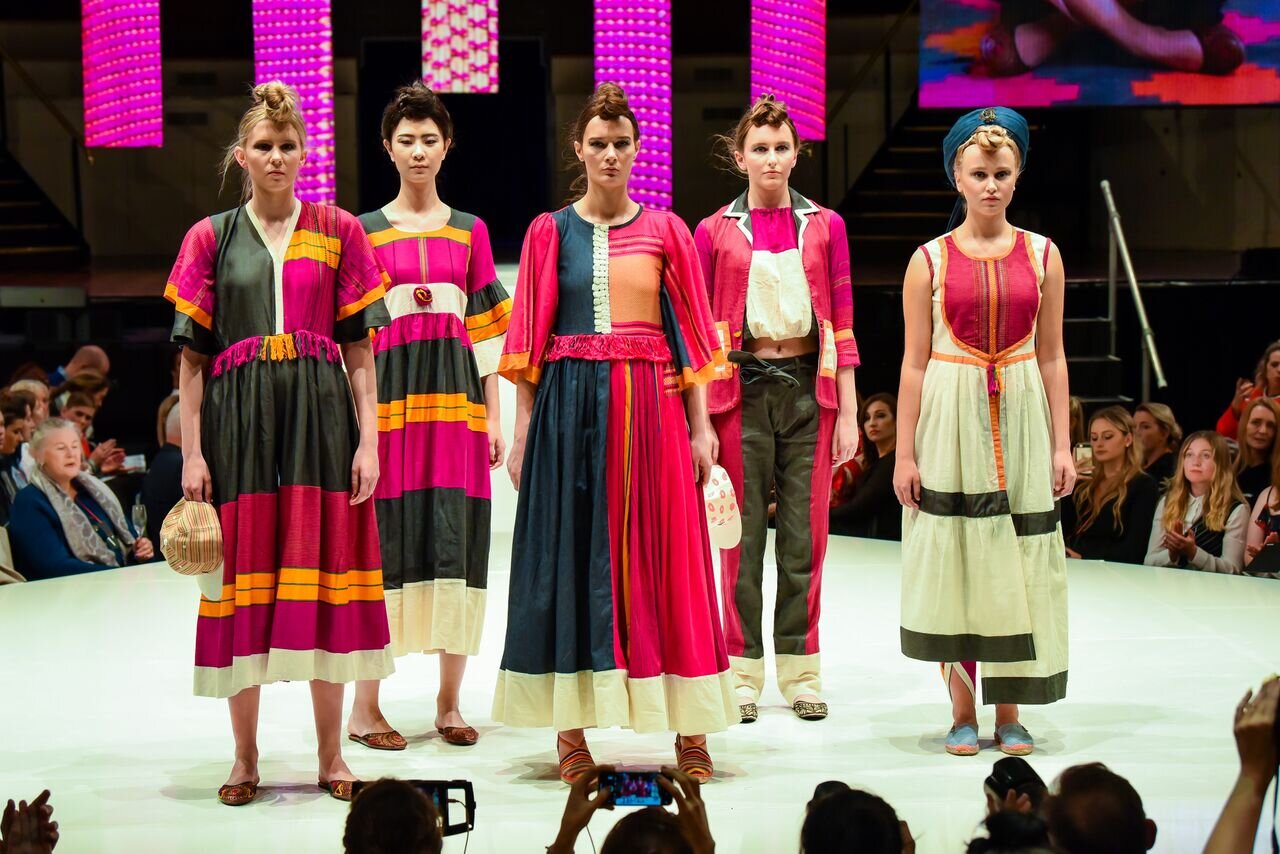Urban Tribal RAP
Rokaiya Ahmed Purna
Urban Tribal - RAP
Rokaiya Ahmed Purna
Bangladesh / BGMEA University of Fashion and Technology
RAP Label has become much more than a destination for timeless Bangladeshi culture fusion work and couture.
Design is a process we use to shape and structure what we wear. But I believe design can be an effective tool for the progress of society. I took everything as a challenge for myself, because most of my relatives used to tell my mom that choosing this subject was the wrong decision. They wanted us to believe there is no future in fashion. I wanted to create my identity with my individuality. I believe no one is going to open doors for me. I needed to create my own door and I am going to create my opportunity rather than waiting for opportunity to come to knock on my door. It’s also hard for me to fight in this kind of situation because I come from a middle-class background. So, I started to work and the money I earned, I used to make my collection, so that I can participate in international competitions from the beginning and continue my study. Living with thoughtful aspects and thinking positively through every part of our work can make a huge impact.
My collections are mostly how much the story of concept means to me or how much it’s important after making collection. It tells a lot of things all at the same time, conveying a message of feminism. Still women lack opportunity. As an activist entrepreneur and fashion designer I always try to emphasize socials aspects, cultural barriers, nature and mother land. including the lifestyle and story of artisans and craftsmen who worked tremendously hard to uphold our history, culture and tradition. My collection is much more than a destination for timeless Bangladeshi culture, fusion, work and couture. Designing is a system that somehow we can use to support our society.
Supporting an artisanal community is significant. Fabrics that are made by hand on a manually operated loom are another interesting aspect of my work. Heritage handloom-woven textiles constitute valuable aspects of Bangladesh culture and heritage. The strong identity of my collections has evolved while always remaining faithful to its inherent standards. The idea of doing something involving weavers at the same time as speaking about them means that from a very personal point of view, I am very happy after making this collection. In Urban Tribal collection, working with artisans helped me to understand the value in working respectfully with artisans and led me on a continuous journey of discovery about ethical consideration through fashion.
Every piece is lovingly, painstakingly and wholeheartedly created by skilled artisans using the highest degree of craftsmanship, quality, devotion and care. It reflects a living heirloom culture. The responsibilities towards the environment, ecosystems and local communities were all kept in mind. Urban collection will help to develop a culture of active environmental design which will not only reduce the negative environmental impacts but also create a positive environmental and economic solution for artisans. Behind collection and products the goal is to develop the design of mutual relation between the employment and natural environment. This involves fashion fusion with sustainability contributing to SDG Goals with gender equality, and empowering women and girls, responsible production and consumption, development of heritage textiles and domestic innovation based on natural resources.
This collection relentlessly strives to support the heritage Bangladeshi artisans, by using heritage textiles - khadi, indigenous handloom fabric - re-innovated with modern elements of design and adding the signature touch, to reach the millennials worldwide. I work closely with our craftspeople and create beautiful, culturally-inspired and innovative hand-woven fabric in texture, motive, patterns and blending the products with different fibres, keeping in mind zero-waste design and product process, collection fabrics from weavers, zero footprint and up cycling, and supporting sustainable livelihoods. I am trying to create an impact through fashion to make rural artisan and craftsman production sustainable. In the future I want to create opportunities for women craftsman and artisans, to take a responsibility towards the preservation of craftmanship heritage weaving techniques and I am planning to follow the philanthropic business model. During Covid we specially started a new line of artisan zero-waste scarves; a lighter way to enjoy fashion, and to support the survival of weavers during this pandemic situation.
Urban Tribal – RAP. Rokaiya Ahmed Purna.
Urban Tribal – RAP. Rokaiya Ahmed Purna.
Urban Tribal – RAP. Rokaiya Ahmed Purna.
Urban Tribal – RAP. Rokaiya Ahmed Purna.
Urban Tribal – RAP. Rokaiya Ahmed Purna.
Urban Tribal – RAP. Rokaiya Ahmed Purna.
Urban Tribal – RAP. Rokaiya Ahmed Purna.
Urban Tribal – RAP. Rokaiya Ahmed Purna.
Urban Tribal – RAP. Rokaiya Ahmed Purna.
Bio: Rokaiya Ahmed Purna
website: rokaiyaahmedpurna.com
instagram: rokaiyaahmedpurna
facebook: rokaiyaahmedpurna
linkedin: rokaiya-ahmed-purna
twitter: rap_purna
YouTube: Rokaiya Ahmed Purna channel









